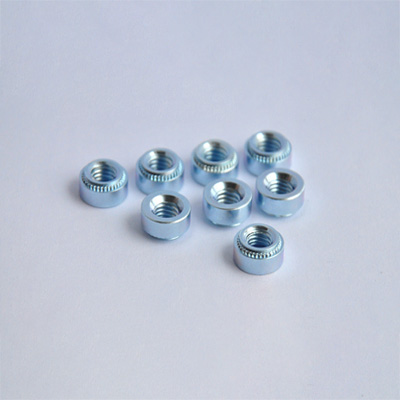When selecting fasteners for various industrial and manufacturing applications, Self-Clinching Rivet Nuts offer a unique solution. They provide strong, durable threads in thin materials where traditional nuts and bolts might not be practical. One of the most critical aspects in selecting the right Self-Clinching Rivet Nut is choosing the appropriate material. The material choice directly affects the rivet nut’s performance, strength, durability, and suitability for specific environments. In this article, we'll explore the common materials used for Self-Clinching rivet nuts, their unique advantages, and guidelines for selecting the best material for your application.

Stainless steel is a popular material for Self-Clinching Rivet Nuts due to its excellent corrosion resistance and durability. It is commonly used in environments exposed to moisture, chemicals, or extreme temperatures.
Advantages:
High corrosion resistance, making it ideal for outdoor or marine applications.
Strong and durable, suitable for heavy-duty applications.
Maintains integrity in a wide temperature range.
Applications:
Automotive industry, particularly in parts exposed to weather.
Marine and aerospace applications where environmental exposure is significant.
Medical and food-processing equipment due to hygienic properties.
Carbon steel is a versatile and cost-effective material, often chosen for general-purpose applications. It provides a good balance between strength, toughness, and affordability, making it suitable for a variety of industrial applications.
Advantages:
High tensile strength, providing strong and reliable fastening.
Cost-effective, making it a popular choice for budget-conscious projects.
Available in different grades to suit specific strength requirements.
Applications:
General manufacturing and construction.
Industrial machinery where high strength is needed but corrosion resistance is not critical.
Automotive applications not exposed to high moisture or chemicals.
Aluminum Self-Clinching Rivet Nuts are valued for their lightweight properties and resistance to corrosion. While not as strong as stainless or carbon steel, aluminum offers a balance of performance and weight reduction, crucial in industries like aerospace.
Advantages:
Lightweight, reducing the overall weight of the product.
Good corrosion resistance, suitable for indoor and mild outdoor environments.
Easier to install due to its malleability.
Applications:
Aerospace and automotive sectors where reducing weight is crucial.
Electronics, where lighter materials are needed for enclosures.
Consumer goods that require a combination of durability and aesthetics.
Brass is an alloy known for its decorative appeal, corrosion resistance, and excellent conductivity. Though it is not as strong as steel, brass has specific advantages that make it suitable for certain applications.
Advantages:
Excellent corrosion resistance, particularly in seawater and environments where chemicals are present.
Aesthetic appeal, often used when the appearance of the fastener matters.
Non-magnetic, beneficial in electronic applications.
Applications:
Electrical and electronic enclosures due to non-magnetic properties.
Plumbing and marine applications because of excellent corrosion resistance.
Decorative applications where appearance is important, like furniture or luxury products.
Choosing the right material for Self-Clinching Rivet Nuts requires consideration of several factors. Below are guidelines to help you make an informed decision:
High Exposure: For environments with high moisture or chemical exposure, stainless steel and brass are the best options due to their corrosion resistance.
Moderate Exposure: Aluminum offers good corrosion resistance for less severe conditions.
Minimal Exposure: Carbon steel is sufficient for indoor environments or areas not subject to harsh conditions.
Heavy-Duty Applications: Carbon steel and stainless steel provide high strength for load-bearing applications or where the fastener will be under significant stress.
Light-Duty or Weight-Sensitive Applications: Aluminum is a better choice when reducing the weight of the assembly is a priority.
Decorative or Light Applications: Brass is suitable where strength is not the primary concern but appearance or conductivity matters.
Extreme Temperatures: Stainless steel is reliable for applications that involve high or low temperatures, as it maintains strength in varying conditions.
Aerospace and Marine: Choose materials like stainless steel or aluminum, which are resistant to corrosion in challenging environments.
General Industrial Use: Carbon steel is sufficient for everyday industrial applications not exposed to extreme conditions.
Budget-Friendly: Carbon steel is the most economical choice for large-scale production when corrosion resistance is not critical.
Long-Term Investment: Stainless steel, while more expensive, offers long-term durability and low maintenance, ideal for high-value projects.
Specialty Use: Brass, while pricier than some alternatives, can be justified for its unique properties in specific applications.
Selecting the correct material for Self-Clinching Rivet Nuts is crucial for ensuring the longevity, performance, and reliability of the assembly. Stainless steel provides unmatched corrosion resistance and strength, while carbon steel balances affordability with durability. Aluminum offers weight reduction with adequate corrosion resistance, and brass is a specialized choice for aesthetics and conductivity.
By understanding the characteristics of each material and matching them to the specific requirements of your application, you can ensure a successful and cost-effective fastening solution. Remember to assess factors like environmental exposure, load requirements, and budget constraints when making your decision. Each material has its strengths, and the right choice can make a significant difference in the quality and durability of the final product.